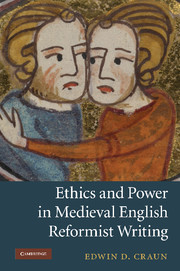Book contents
- Frontmatter
- Contents
- Acknowledgments
- Editorial practices, translations, abbreviations
- Introduction
- 1 Universalizing correction as a moral practice
- 2 Negotiating contrary things
- 3 Managing the rhetoric of reproof: the B-version of Piers Plowman
- 4 John Wyclif: disciplining the English clergy and the Pope
- 5 Wycliffites under oppression: fraternal correction as polemical weapon
- 6 Lancastrian reformist lives: toeing the line while stepping over it
- Postscript
- Notes
- Bibliography
- Index
- CAMBRIDGE STUDIES IN MEDIEVAL LETERATURE
5 - Wycliffites under oppression: fraternal correction as polemical weapon
Published online by Cambridge University Press: 15 April 2010
- Frontmatter
- Contents
- Acknowledgments
- Editorial practices, translations, abbreviations
- Introduction
- 1 Universalizing correction as a moral practice
- 2 Negotiating contrary things
- 3 Managing the rhetoric of reproof: the B-version of Piers Plowman
- 4 John Wyclif: disciplining the English clergy and the Pope
- 5 Wycliffites under oppression: fraternal correction as polemical weapon
- 6 Lancastrian reformist lives: toeing the line while stepping over it
- Postscript
- Notes
- Bibliography
- Index
- CAMBRIDGE STUDIES IN MEDIEVAL LETERATURE
Summary
The radical but pragmatic reformist uses to which John Wyclif turned fraternal correction – disendowment of the English clergy, lay administration of tithes, withdrawal of obedience to errant popes – were embraced in the writings of his followers, perhaps even before his death in 1384. Embracing the practice, however, did not entail leaving it unaltered. As Anne Hudson has argued for several decades, the Wycliffites were highly conscious of their identity as a social group. I use the term “Wycliffite” because no document brands Wyclif's disciples as “lollards” until the late 1380s and because I am persuaded by Andrew Cole's argument on the relation of lollardy and Wycliffism: that Wycliffism involved adhering to classifiable, condemned beliefs, while lollardy involved commitment to a radical imitation of Christ as beggar, a commitment that could engage the orthodox, the Wycliffites, and those betwixt and between. In this sense, Wycliffites were heretics. They held pertinaciously and explicitly beliefs condemned by the Pope and, later, English councils, fraternal correction as a lay disciplinary practice not least among them.
Most Wycliffite writing that seizes on fraternal correction as a fundamental religious practice was composed and was circulating from Wyclif's last several years to just after the turn of the century. Archbishop Thomas Arundel's legislation promulgated in 1409, much discussed by scholars recently, restricted somewhat writing about religion, especially reformist writings, as did the vigorous repression of dissent by the Lancastrian kings. That belongs to the next chapter, but sets a terminus ad quem for this.
- Type
- Chapter
- Information
- Ethics and Power in Medieval English Reformist Writing , pp. 101 - 119Publisher: Cambridge University PressPrint publication year: 2010



